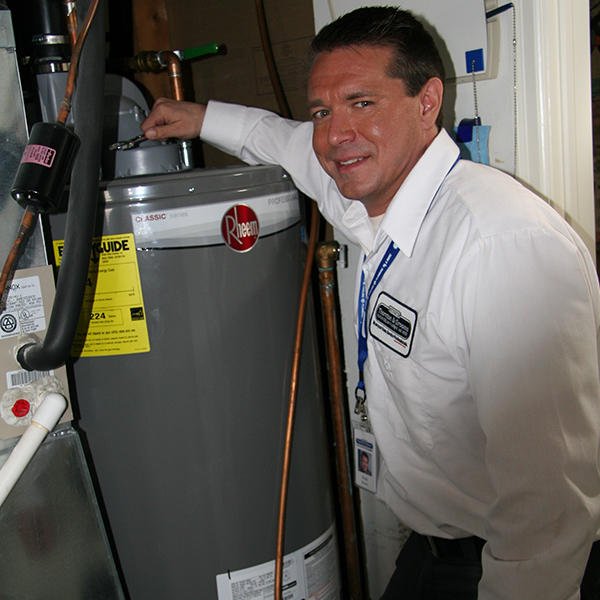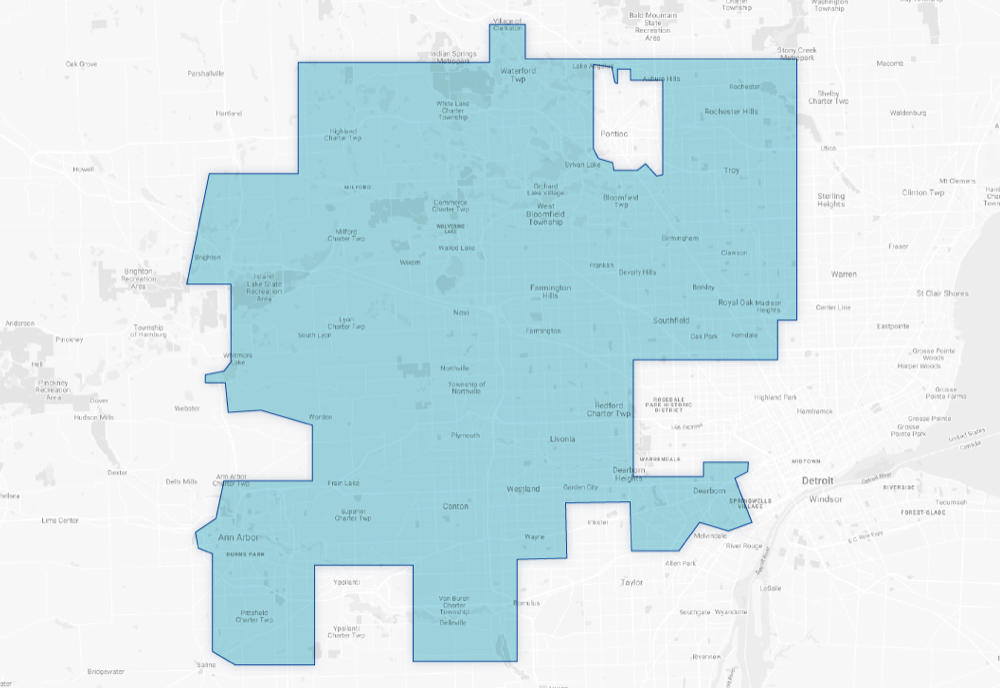Water heater repairs in Farmington Hills, MI
Friendly Water Heater Repair Pros Who Put You First

Repairs that put our customers first with…
- Friendly, respectful technicians
- Upfront, flat-rate pricing
- Same-day service available
Get expert advice with free water heater estimates! Whether you need a repair or replacement, we’ll help you find the best solution for your home.
PriceCost of a Water Heater Repair in Michigan
- Low: $1,500
- Average: $4,400
- High: $7,000
- Low: $200
- Average: $800
- High: $4,000
Why such a wide price range?
Water heater installations are affected by several price factors, including:
The type of water heater:
Tank water heaters have fewer parts and are generally easier to repair (and less expensive to repair) than tankless water heaters.Warranties:
A valid warranty will limit how much a homeowner has to pay to replace parts. If a warranty is expired, the cost of a repair can increase significantly.The contractor:
Contractors have different service rates based on years in business, skill level and other factors.
Cost of a Water Heater Repair in Michigan
- Low: $1,500
- Average: $4,400
- High: $7,000
- Low: $200
- Average: $800
- High: $4,000
Why such a wide price range?
Water heater installations are affected by several price factors, including:
The type of water heater:
Tank water heaters have fewer parts and are generally easier to repair (and less expensive to repair) than tankless water heaters.Warranties:
A valid warranty will limit how much a homeowner has to pay to replace parts. If a warranty is expired, the cost of a repair can increase significantly.The contractor:
Contractors have different service rates based on years in business, skill level and other factors.
ProcessYour Water Heater Repair in 4 Easy Steps

1. Schedule an appointment
Start the repair process by calling us at (248) 644-7810 or scheduling your repair online. A water heater specialist will be assigned to your case ASAP. If you have one of our popular Michigan-made Bradford White water heaters, make sure to let us know!

2. Get appointment notifications by text
We'll call you the day before to remind you about the appointment. On the day of the appointment, your tech will send you a text with their name, a picture and past reviews.

3. Enjoy peace of mind during the repair
Your plumber will arrive right on time, greet you at your door, and ask politely to see your water heater. From there, the plumber will share their findings, review pricing with you and answer any questions you have during the repair.

4. Take our brief survey
After we've left, you'll receive a text message or email with a brief survey. If your water heater repair went well, that's great! If not, let us know what went wrong so we can make it right.
Your Water Heater Repair in 4 Easy Steps
1. Schedule an appointment
Start the repair process by calling us at (248) 644-7810 or scheduling your repair online. A water heater specialist will be assigned to your case ASAP. If you have one of our popular Michigan-made Bradford White water heaters, make sure to let us know!
2. Get appointment notifications by text
We'll call you the day before to remind you about the appointment. On the day of the appointment, your tech will send you a text with their name, a picture and past reviews.
3. Enjoy peace of mind during the repair
Your plumber will arrive right on time, greet you at your door, and ask politely to see your water heater. From there, the plumber will share their findings, review pricing with you and answer any questions you have during the repair.
4. Take our brief survey
After we've left, you'll receive a text message or email with a brief survey. If your water heater repair went well, that's great! If not, let us know what went wrong so we can make it right.
Reviews
“He even brought our garbage can in after the truck went by…”
Our water heater went out sometime Tuesday or Wednesday. I submitted an appointment request online Wednesday night, and was called at 7am Thursday. Problem was fixed by 1pm that day. Very thorough and professional. Helped us get the part under warranty. Will use again in the future. Todd even brought our garbage can in after the truck went by.
-Meagan G.
We Care GuaranteeA Guarantee You Won't Find Anywhere Else.
We promise to provide our customers with 5-star service—no matter what. If you are not satisfied with our level of service at any point, we ask that you inform us so we can make it right before we leave your home.

We honor these guarantees for every water heater repair:
Professionalism
We are a team of skilled, knowledgeable professionals who undergo regular training to provide top-notch service and solutions at a fair cost.
Reputation
We truly care about providing 5-star service to our customers and our community. With thousands of Google reviews (we reply to each one!), it seems our customers agree.
Convenience
We know customers already have enough to deal with, so we offer friendly and convenient service from the first call to our post-service process.
A Guarantee You Won't Find Anywhere Else.
We promise to provide our customers with 5-star service—no matter what. If you are not satisfied with our level of service at any point, we ask that you inform us so we can make it right before we leave your home.

We honor these guarantees for every water heater repair:
Professionalism
We are a team of skilled, knowledgeable professionals who undergo regular training to provide top-notch service and solutions at a fair cost.
Reputation
We truly care about providing 5-star service to our customers and our community. With thousands of Google reviews (we reply to each one!), it seems our customers agree.
Convenience
We know customers already have enough to deal with, so we offer friendly and convenient service from the first call to our post-service process.
Service Area
- Ann Arbor
- Beverly Hills
- Birmingham
- Bloomfield Hills
- Farmington Hills
- Franklin
- Canton
- Garden City
- Livonia
- Novi
- Plymouth
- Rochester Hills
- Royal Oak
- Southfield
- Troy
- West Bloomfield
- Westland
- Northville
- Lake Angelus
... and many others.
See our full service area
